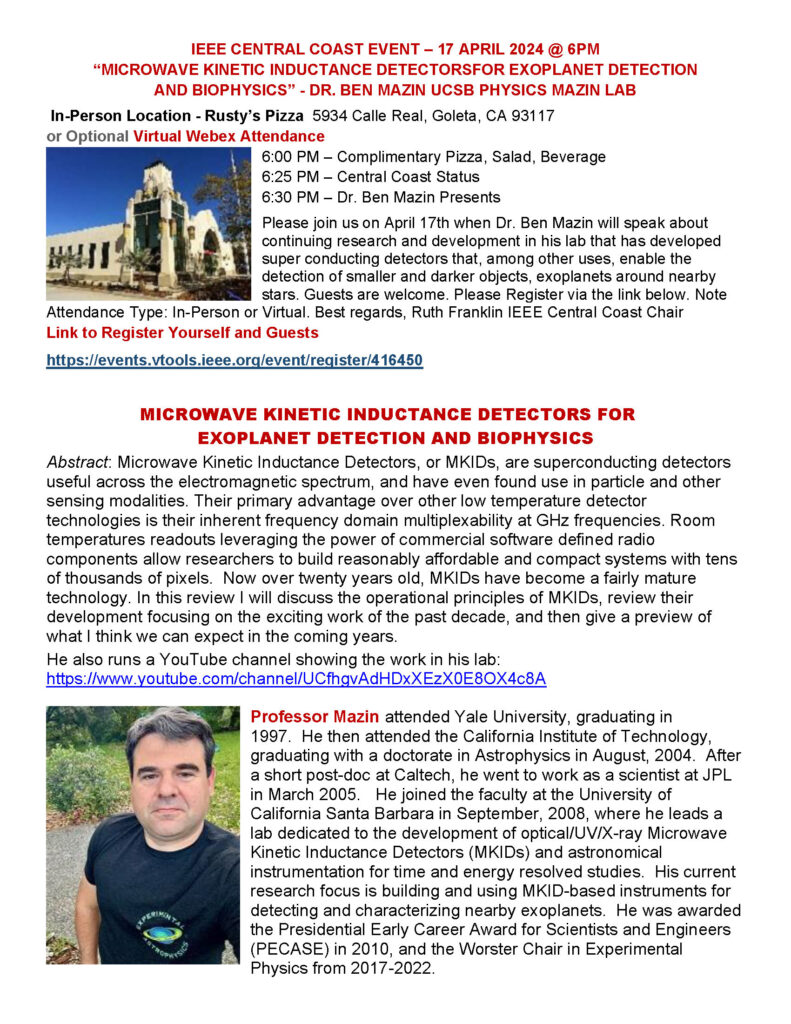MICROWAVE KINETIC INDUCTANCE DETECTORS FOR EXOPLANET DETECTION AND BIOPHYSICS – 17 APRIL 2024 @ 6PM
IEEE CENTRAL COAST EVENT – 17 APRIL 2024 @ 6PM
“MICROWAVE KINETIC INDUCTANCE DETECTORS FOR EXOPLANET DETECTION AND BIOPHYSICS” – DR. BEN MAZIN UCSB PHYSICS MAZIN LAB
In-Person Location – Rusty’s Pizza 5934 Calle Real, Goleta, CA 93117
or Optional Virtual Webex Attendance
6:25 PM – Central Coast Status
6:30 PM – Dr. Ben Mazin Presents
Please join us on April 17th when Dr. Ben Mazin will speak about continuing research and development in his lab that has developed super conducting detectors that, among other uses, enable the detection of smaller and darker objects, exoplanets around nearby stars. Guests are welcome. Please Register via the link below. Note Attendance Type: In-Person or Virtual. Best regards, Ruth Franklin IEEE Central Coast Chair
Link to Register Yourself and Guests: htts://events.vtools.ieee.org/event/register/416450
Microwave Kinetic Inductance Detectors for Exoplanet Detection and Biophysics
Abstract: Microwave Kinetic Inductance Detectors, or MKIDs, are superconducting detectors useful across the electromagnetic spectrum, and have even found use in particle and other sensing modalities. Their primary advantage over other low temperature detector technologies is their inherent frequency domain multiplexability at GHz frequencies. Room temperatures readouts leveraging the power of commercial software defined radio components allow researchers to build reasonably affordable and compact systems with tens of thousands of pixels. Now over twenty years old, MKIDs have become a fairly mature technology. In this review I will discuss the operational principles of MKIDs, review their development focusing on the exciting work of the past decade, and then give a preview of what I think we can expect in the coming years.
He also runs a YouTube channel showing the work in his lab: https://www.youtube.com/channel/UCfhgvAdHDxXEzX0E8OX4c8A
Professor Mazin attended Yale University, graduating in 1997. He then attended the California Institute of Technology, graduating with a doctorate in Astrophysics in August, 2004. After a short post-doc at Caltech, he went to work as a scientist at JPL in March 2005. He joined the faculty at the University of California Santa Barbara in September, 2008, where he leads a lab dedicated to the development of optical/UV/X-ray Microwave Kinetic Inductance Detectors (MKIDs) and astronomical instrumentation for time and energy resolved studies. His current research focus is building and using MKID-based instruments for detecting and characterizing nearby exoplanets. He was awarded the Presidential Early Career Award for Scientists and Engineers (PECASE) in 2010, and the Worster Chair in Experimental Physics from 2017-2022.


